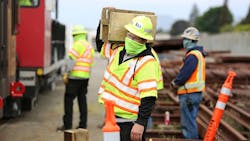BART steps up small business outreach and opportunities
The Bay Area Rapid Transit (BART) is working to increase opportunities available to small businesses during the COVID-19 pandemic, helping to continue essential construction projects and keeping small business employees on the job.
"We are actively soliciting as many small businesses as possible to help us with essential work that has to be done," said Fei Liu, of BART's Office of Civil Rights. "Some people say a large organization like BART, it can be bureaucratic. COVID-19 has forced us to be more flexible and innovative."
For example, before the pandemic, BART held large networking gatherings where prime contractors would discuss the work they have available and interview small business subcontractors to look for a good fit.
At pre-coronavirus networking sessions, each prime contractor had a booth or table where subcontractors can make the rounds, giving their best elevator pitches in private discussions.
"That kind of set-up is not really possible with safe social distancing, so we have adjusted," Liu said.
Now, prime contractors are setting aside a full day, for example, to hold virtual "speed-dating" sessions by teleconference, where in eight hours they will interact with up to 48 subcontractors.
"The meetings are five minutes long with a five-minute buffer in between, so they really have to get to the point and have their pitches down," Fei said.
The prime contractors must provide BART with their schedule so they can show whom they interviewed.
"This work is even more important with small businesses now being affected by shelter-in-place orders," said Fei, who one day last week sent more than 500 emails to small businesses.
One small business that has been participating in essential work is Oakland-based construction management firm VSCE Inc.
VSCE President Jesus Vargas is an industry leader who last week was part of a Construction Management Association of America webinar offering advice on steps to mitigate the COVID-19 crisis.
"Being certified as a DBE (disadvantaged business enterprise) allows us to be competitive for contracts," Vargas said. "Our first contract with BART was about four and a half years ago, and as a result of that we were able to get to work on many other projects, from ADA improvements, to better roadway approaches at stations, to monitoring overnight work and more."
Vargas added, "All of those projects gave us quite a bit of experience, being BART-trained, safety-trained, being able to work efficiently in the BART system, and that made us attractive to large companies that want to include us on their teams. Our staff got important experience and we were able to get into bigger projects."
Now VSCE's 35 employees are working for transit agencies, including BART, where they are providing construction management and other services under the prime contractor Parsons Transportation Group. Employees work on escalator canopies, rail grinder delivery oversight, Communication-Based Train Control and many other BART projects.
"During COVID-19 many long-term projects are still underway," Vargas said. "They're deemed essential. BART has made accommodations for our staff to work safely on those projects. There's a huge relief that our employees can continue to have their income to support their families. We're proud to be part of the essential work force that keeps the mobility of the Bay Area going. There's a great deal of empowerment in that.”
Liu emphasized that BART is working at full speed to help small businesses find work on BART contracts. Recently, his office managed a session for contractors who hope to get work outfitting BART's new headquarters at 2150 Webster Street. A point person for each potential bidder walked through the space to envision what type of work environment they could create for the next chapter in BART's future.
Also, BART's Small Business Support Services group held two webinars in March and April to help prepare small businesses for their networking sessions; more than 150 people attended the webinars. Talk included how to use best practices for teleconferencing and techniques for delivering an effective five-minute pitch to potential prime contractors.
Many transit projects are designated as essential public works per the region’s public health orders issued in response to the coronavirus. The county orders generally ban construction unless it is being conducted to maintain or build essential infrastructure. BART says it is prioritizing the safety of its workers and contractors by following social distancing guidelines for all critical infrastructure projects that can proceed under state and regional stay-at-home orders. Vargas says he is focused on the jobs at hand. For example, last week his engineers oversaw delivery of a new rail grinder at the Hayward maintenance yard. BART says everything went smoothly and according to plan, with workers wearing personal protective equipment and keeping distance.
"It’s gratifying knowing that in times like this if I can do my part and help out my community. It’s a positive thing for everyone," said Vargas.
Liu added, "We’re all humans, and we want to make sure everyone is doing well. If we have the capability to help people keep their jobs, even to look for additional opportunities for work, it’s definitely a benefit to our community."
